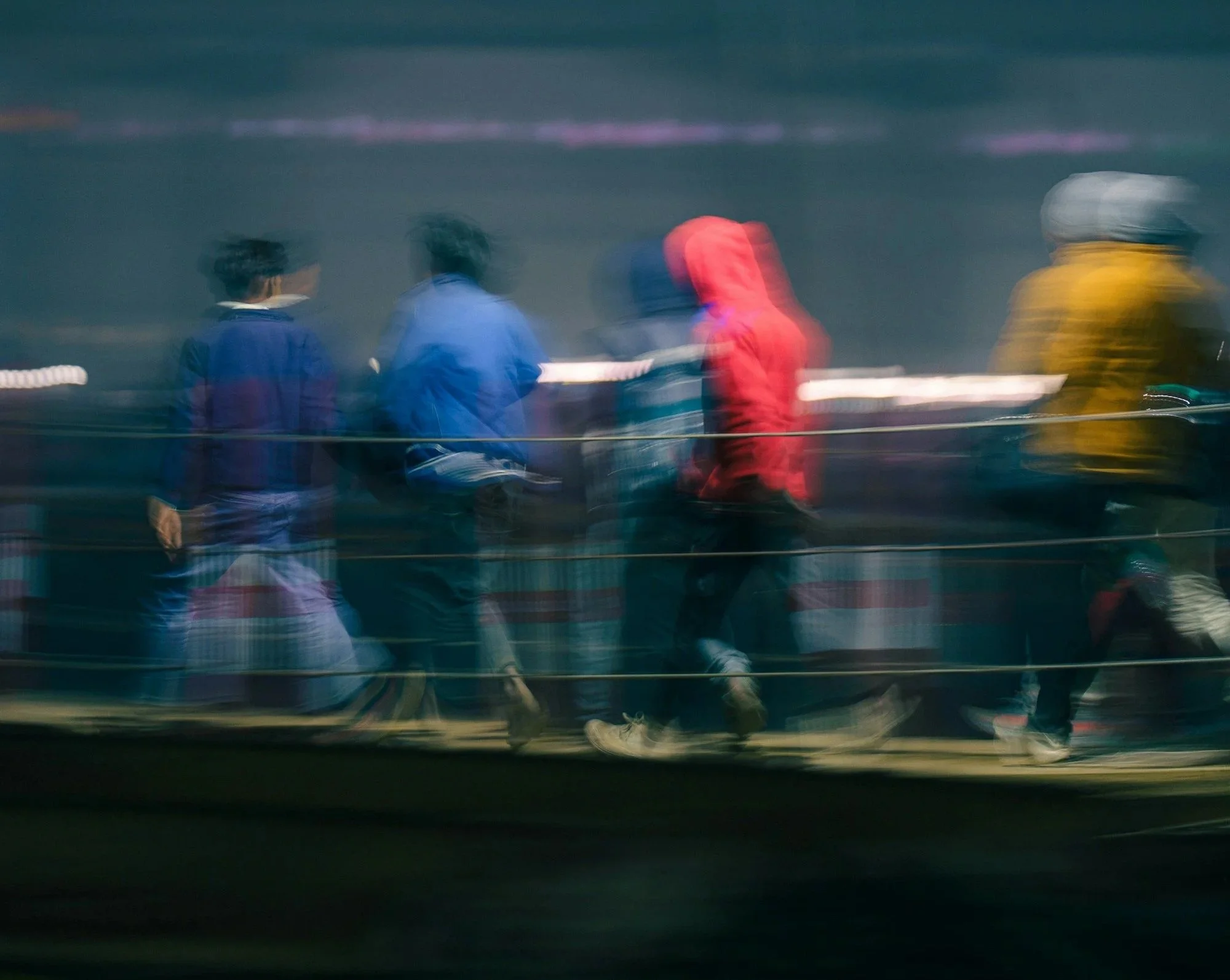Building on the fracture
Toward an economy of the Common Good.
By Francesco Piobbichi
Cooperation is not an abstract ethical utopia: it is the founding principle of life itself. From cellular symbiosis — which made the evolution of species possible — to human communities that thrive through mutual aid, and to political models based on municipalism and direct democracy, a constant logic emerges: to survive and prosper means to weave bonds, share resources, and build networks.
This logic collides head-on with the dominant paradigm: neoliberal Darwinism and the nation-state that sustains it. In the 1970s, biologist Lynn Margulis proposed the Serial Endosymbiotic Theory (SET), initially received with skepticism but ultimately revolutionary for biology. Her thesis was radical: many of the key innovations in evolution — such as the emergence of the eukaryotic cell, a complex cell with a well-defined nucleus — arose not from competition, but from the integration of different organisms into a single system.
Mitochondria and chloroplasts, for example, are ancient bacteria incorporated by other cells in a relationship of mutual advantage. Hence the concept of the holobiont: a complex organism composed of multiple species in symbiosis, with a combined genetic heritage (hologenome) that determines health, development, and adaptation. The human being is a holobiont — we survive thanks to an invisible community of microbes, fungi, and viruses, particularly within the gut microbiota.
This scientific vision finds a striking echo in Pëtr Kropotkin, who in Mutual Aid argued that cooperation is an evolutionary force as crucial as natural selection. Observing animal communities in Siberia and the Arctic, Kropotkin noted that survival was often ensured not by competition, but by mutual support. For him, mutual aid was not a moral principle but a successful evolutionary strategy.
Today, Abdullah Öcalan reformulates this insight through democratic confederalism: a system where power is rooted in local communities, organized into autonomous and federated assemblies — a political concept grounded in direct democracy, feminism, and environmentalism.
Cooperation thus becomes a daily practice: collective management of resources, direct participation, respect for cultural and ecological diversity, and women’s liberation. Öcalan’s ideas resonate with those of Murray Bookchin, theorist of social ecology and libertarian municipalism. Bookchin maintained that cities must once again become spaces of collective decision-making, governed by neighborhood assemblies interconnected in confederations, with an ethical economy centered on human needs and the good life.
Communal Autonomy and the Nation-State
If the cooperative paradigm — from cell to city — is based on autonomy and interdependence, the nation-state is its antithesis.
Electoral parties act as its political arm, integrating society into a hollow democracy:
absorbing social conflict and neutralizing it through parliamentary debate;
transforming radical demands into programs compatible with the state apparatus;
maintaining a pyramidal power structure reproduced through bureaucracy and political class;
surviving through electoral competition without producing real change.
Antonio Gramsci perceived that the party could be the “modern prince,” capable of unifying and directing the revolutionary social bloc. But in a historical phase dominated by the strategic centrality of the nation-state, this intuition has become more a trap than a possibility: the Prince, in the hands of the electoral party, does not emancipate but integrates the masses into the state mechanism.
Niccolò Machiavelli, in The Prince, offers a manual for conquering and maintaining state power, concentrating decision-making and command at the top. A century later, Thomas Hobbes provides the definitive philosophical justification: in the homo homini lupus — the “war of all against all” — peace can be ensured only by ceding all power to an absolute sovereign, the Leviathan.
It is a vision founded on fear and mutual distrust, assuming conflict as the natural state and reducing cooperation to a product of coercion.
The modern nation-state is born of this logic: it presents itself as guarantor of order, yet draws strength precisely from the social fragmentation it produces.
Where Hobbes sees centralization as the only antidote to chaos, the paradigm of the holobiont and mutual aid shows that order can emerge from self-governance and spontaneous cooperation. It is not authority that prevents mutual destruction, but the ability of communities to organize and sustain themselves without a sovereign center.
Cooperation vs. Competition
The logic of the holobiont points us toward another path:
dismantling the pyramid of power and replacing it with horizontal confederated networks of cooperation;
organizing in neighborhoods and municipalities, building social fabrics of grassroots welfare and mutualism run by democratic assemblies;
constructing popular power from below until the old structures of bourgeois democracy become obsolete.
Capitalism is an infection of this social dimension: it not only systematically loots resources but prevents their development, exercising domination over the social body through the state.
What is needed is an organizational terrain that recognizes cooperation and fosters its confederation — not merely at the local level but as the foundation of a new confederal internationalism that places the ecological question at its core.
A dialectical, non-linear process that grows through confrontation with the state and requires that political direction emerge from society itself.
The Social Party: Confederation and Cooperation
This model could be called a “social party”: the part of society that builds and grows outside the nation-state, in its margins and contradictions.
A connective organization that unites mutual aid, direct democracy, and grassroots bargaining — not to become the Prince, but to dissolve his throne by upholding society itself.
Such an endeavor is revolutionary and demands a radical rethinking of social relations. It requires militants with an ethical and moral approach to politics — entirely different from the logic of power struggle and leadership selection that dominates electoral parties (now reduced to media platforms promoting political actors).
In this sense, it becomes crucial to confront the how realistically. On one hand, we must not become an electoral party following the norms of power and domination of the nation-state; on the other, we must recognize that the electoral process (rather than the party itself) can be used tactically within the nation-state to democratize and decentralize it. Essential to this is countering patriarchy through women’s protagonism, which can expand participatory dynamics and reshape collective leadership.
Communalism: common social practices on the ground
In the 2025 elections in Marche and Calabria, only half of eligible voters cast their ballots — a general trend. Whoever wins will represent little more than a quarter of the population. Abstention has sent a political signal of rupture that must be read beyond the rhetoric of popular apathy. The system of integration between society and the state — once mediated by mass parties and intermediaries — has broken down. It will not heal, as the state itself has already emptied the apparent meaning of bourgeois democracy.
Unless a new political and moral ideology capable of developing collective action outside these mechanisms is built, the authoritarian drift will deepen, and every spark of resistance will be drained of strength — either repressed or co-opted.
The paradox is that voting today increasingly legitimizes an empty democracy, where control over media, finance, and clientelist voting blocs largely determines the outcome.
Yet the electoral terrain remains partially usable: antagonistic forces may still emerge within the fractures of society. With these forces, cooperation on common social practices will be essential — but only if they act generously, placing themselves at the service of society and its political direction, as seen in the movement for Palestine.
However, continuing to think of politics solely through the lens of elections within the state remains the greatest limitation of the Italian and European left — a limitation that historical transformation will sooner or later force us to overcome.
We must therefore concentrate on the municipal level as a direct exercise of political direction between the organized social party and state institutions. The higher levels — regional and national — are nearly impossible to alter, as the state’s bureaucratic and juridical machinery persists regardless of who governs in the service of capital.
The nation-state has developed, over centuries, an extraordinarily effective capacity to integrate the social body into its logic of domination — shaping us all to conform to its form, its pace, its pyramidal organization. Escaping this system will not be easy in an advanced capitalist society such as ours. But given the incapacity of historic lefts (both social-democratic and revolutionary) to resolve social crises, new paths must be forged.
The New Internationalism
The movement of solidarity with the people of Gaza has emerged from below, demonstrating that political direction can be exercised without electoral parties or state-bureaucratized unions. It has brought the question of radical territorial practices — such as blockades — to the forefront, built international solidarity, and unmasked the true face of nation-states.
Though sparked by a single issue, it operates as a constituent process capable of opposing the war on humanity waged by nation-states through domination. The Palestinian struggle, and the abandonment of an entire people by all nation-states, teaches us that the only viable response must rest on a foundation that unites direct action, mutuality, and international solidarity — a cooperative process that transcends protest and enters daily life.
The experience of the Global Sumud Flotilla exemplifies this: it has forged global alliances strong enough to corner the Israeli state and its accomplices.
Yet we must ask ourselves: how is it possible that millions strike and protest, and then on Monday return to shopping from companies complicit in genocide? Imagine if that million people marching in Rome had their own economy — where they could buy products untainted by genocide, exploitation, or environmental devastation.
We must build that alternative time — the one that exists between a demonstration and a strike — the time that creates, day by day, a society and economy of the common good.
To think about building an economy of the common good means to think about how to organize society itself, to face the challenges this practice entails. Building community cooperatives, people’s stores and emporiums, grassroots welfare systems, shared logistics, and social uses of land — posing the question of production instead of begging crumbs from the masters of the world — is an immense task.
Social practices of solidarity and direct action are our greatest strength: they are where conflict and indignation take shape. The Global Sumud Flotilla has shown this clearly.
Now we must build organizations that move in this direction — fostering cooperation instead of the competition typical of neoliberalism, and overcoming the territorial fragmentation in which we live.
There is much to build, but a path has opened.







